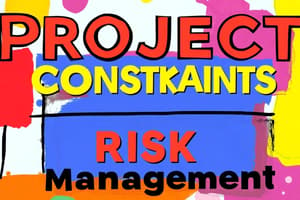Podcast
Questions and Answers
A senior stakeholder is refusing to sign off on a project phase, insisting on additional changes that will impact cost and schedule. The changes are not critical, but the stakeholder is highly influential within the organization. The team is ready to proceed but is concerned about the stakeholder's pushback. What should the project manager do?
A senior stakeholder is refusing to sign off on a project phase, insisting on additional changes that will impact cost and schedule. The changes are not critical, but the stakeholder is highly influential within the organization. The team is ready to proceed but is concerned about the stakeholder's pushback. What should the project manager do?
- Escalate the issue to leadership and request intervention to approve the phase.
- Reject the changes outright and proceed with the project plan as scheduled.
- Negotiate a compromise by identifying changes that align with stakeholder concerns while maintaining feasibility. (correct)
- Accept all requested changes to maintain a strong stakeholder relationship.
A vendor contract negotiation is at a standstill because the vendor is demanding an unrealistic payment schedule that conflicts with the project's financial constraints. The vendor is critical to the project, and delays in negotiation are impacting timelines. What should the project manager do?
A vendor contract negotiation is at a standstill because the vendor is demanding an unrealistic payment schedule that conflicts with the project's financial constraints. The vendor is critical to the project, and delays in negotiation are impacting timelines. What should the project manager do?
- Escalate the issue to leadership and wait for their decision.
- Accept the vendor's terms to avoid delays and ensure continuity.
- Terminate negotiations and find an alternative vendor immediately.
- Propose a performance-based payment structure that aligns with project cash flow constraints. (correct)
A project team is negotiating resource allocation with another department, but the department head is reluctant to release personnel due to competing priorities. The project is falling behind schedule as a result. What should the project manager do?
A project team is negotiating resource allocation with another department, but the department head is reluctant to release personnel due to competing priorities. The project is falling behind schedule as a result. What should the project manager do?
- Offer financial incentives to the department head to secure the resources.
- Demonstrate the project's strategic value while proposing phased resource sharing. (correct)
- Escalate the issue immediately and request executive-level intervention.
- Proceed with existing resources and extend timelines as needed.
A client is using their leverage to demand late-stage project changes that will increase costs and extend delivery timelines. The contract does not explicitly prohibit such changes, but they are outside the originally agreed-upon scope. What should the project manager do?
A client is using their leverage to demand late-stage project changes that will increase costs and extend delivery timelines. The contract does not explicitly prohibit such changes, but they are outside the originally agreed-upon scope. What should the project manager do?
A supplier has under-delivered on key components, affecting the project schedule. They are offering a price discount instead of expedited delivery, but the project cannot afford additional delays. What should the project manager do?
A supplier has under-delivered on key components, affecting the project schedule. They are offering a price discount instead of expedited delivery, but the project cannot afford additional delays. What should the project manager do?
A functional manager is pushing back against project demands, arguing that their team is already overburdened and cannot meet the requested deliverables on time. The manager holds key resources needed for project success. What should the project manager do?
A functional manager is pushing back against project demands, arguing that their team is already overburdened and cannot meet the requested deliverables on time. The manager holds key resources needed for project success. What should the project manager do?
During contract negotiations, the other party is employing high-pressure tactics, insisting that their offer is non-negotiable and must be accepted immediately. The terms are not favorable to the project's financial interests. What should the project manager do?
During contract negotiations, the other party is employing high-pressure tactics, insisting that their offer is non-negotiable and must be accepted immediately. The terms are not favorable to the project's financial interests. What should the project manager do?
A team member negotiating a contract with a third party is focusing only on price, neglecting other contractual terms that could impact long-term risk. What should the project manager do?
A team member negotiating a contract with a third party is focusing only on price, neglecting other contractual terms that could impact long-term risk. What should the project manager do?
A highly experienced project stakeholder is resisting a proposed risk mitigation strategy, arguing that historical data suggests the risk is negligible. However, the project team believes the risk must be addressed. What should the project manager do?
A highly experienced project stakeholder is resisting a proposed risk mitigation strategy, arguing that historical data suggests the risk is negligible. However, the project team believes the risk must be addressed. What should the project manager do?
A senior executive is pressuring the project team to commit to an unrealistic deadline. The team is concerned about quality risks, but the executive argues that meeting the deadline is non-negotiable. What should the project manager do?
A senior executive is pressuring the project team to commit to an unrealistic deadline. The team is concerned about quality risks, but the executive argues that meeting the deadline is non-negotiable. What should the project manager do?
A client is insisting on additional features outside the agreed scope, arguing that they were implied in earlier discussions. The project team is concerned about scope creep, but the client refuses to sign off on the current deliverables without these changes. What should the project manager do?
A client is insisting on additional features outside the agreed scope, arguing that they were implied in earlier discussions. The project team is concerned about scope creep, but the client refuses to sign off on the current deliverables without these changes. What should the project manager do?
A vendor is requesting a price increase, citing unforeseen material costs that were not accounted for in the original contract. The project budget is already tight, and there is limited flexibility for additional expenses. What should the project manager do?
A vendor is requesting a price increase, citing unforeseen material costs that were not accounted for in the original contract. The project budget is already tight, and there is limited flexibility for additional expenses. What should the project manager do?
A functional manager is unwilling to release key team members needed for a critical project phase, arguing that their department's workload is already stretched. The delay is impacting project timelines, and leadership is expecting a resolution. What should the project manager do?
A functional manager is unwilling to release key team members needed for a critical project phase, arguing that their department's workload is already stretched. The delay is impacting project timelines, and leadership is expecting a resolution. What should the project manager do?
A supplier is failing to meet performance expectations, but the contract does not include clear penalties for underperformance. Stakeholders are concerned about delays, and the supplier is offering minimal concessions. What should the project manager do?
A supplier is failing to meet performance expectations, but the contract does not include clear penalties for underperformance. Stakeholders are concerned about delays, and the supplier is offering minimal concessions. What should the project manager do?
A team member involved in a negotiation with an external contractor is prioritizing speed over long-term risk considerations. The contract favors short-term cost savings, but there are potential liabilities that have not been fully assessed. What should the project manager do?
A team member involved in a negotiation with an external contractor is prioritizing speed over long-term risk considerations. The contract favors short-term cost savings, but there are potential liabilities that have not been fully assessed. What should the project manager do?
A client is using their influence to demand a contract renegotiation after the project has already begun. They argue that market conditions have changed, but the team believes that the agreed-upon terms should be upheld. What should the project manager do?
A client is using their influence to demand a contract renegotiation after the project has already begun. They argue that market conditions have changed, but the team believes that the agreed-upon terms should be upheld. What should the project manager do?
A third-party contractor is negotiating for broader decision-making authority, arguing that their expertise will speed up execution. However, the project team is concerned about losing control over key deliverables. What should the project manager do?
A third-party contractor is negotiating for broader decision-making authority, arguing that their expertise will speed up execution. However, the project team is concerned about losing control over key deliverables. What should the project manager do?
An internal stakeholder is unwilling to compromise on budget constraints, refusing to consider any scope adjustments despite significant project risks. The team believes modifications are necessary to ensure project success. What should the project manager do?
An internal stakeholder is unwilling to compromise on budget constraints, refusing to consider any scope adjustments despite significant project risks. The team believes modifications are necessary to ensure project success. What should the project manager do?
A vendor is refusing to disclose certain cost breakdowns, arguing that their pricing model is proprietary information. The project team is concerned about transparency, as cost overruns have already occurred. What should the project manager do?
A vendor is refusing to disclose certain cost breakdowns, arguing that their pricing model is proprietary information. The project team is concerned about transparency, as cost overruns have already occurred. What should the project manager do?
A high-ranking stakeholder is pushing for contract changes that introduce unclear accountability structures. The team is concerned about operational confusion, but the stakeholder insists the changes will improve agility. What should the project manager do?
A high-ranking stakeholder is pushing for contract changes that introduce unclear accountability structures. The team is concerned about operational confusion, but the stakeholder insists the changes will improve agility. What should the project manager do?
A client is demanding price reductions after the contract has been signed, citing budget constraints that were not discussed earlier. The project has fixed financial commitments, and reducing costs could impact deliverable quality. What should the project manager do?
A client is demanding price reductions after the contract has been signed, citing budget constraints that were not discussed earlier. The project has fixed financial commitments, and reducing costs could impact deliverable quality. What should the project manager do?
A vendor is consistently late on deliveries but claims that external supply chain issues are outside their control. Stakeholders are pressuring the project team to escalate, but the vendor remains non-committal about improvements. What should the project manager do?
A vendor is consistently late on deliveries but claims that external supply chain issues are outside their control. Stakeholders are pressuring the project team to escalate, but the vendor remains non-committal about improvements. What should the project manager do?
A functional manager has agreed to provide resources for a project but is now backtracking, arguing that higher-priority initiatives have emerged. The delay is jeopardizing project timelines, but the manager has authority over allocations. What should the project manager do?
A functional manager has agreed to provide resources for a project but is now backtracking, arguing that higher-priority initiatives have emerged. The delay is jeopardizing project timelines, but the manager has authority over allocations. What should the project manager do?
A contractor has exceeded their approved budget, citing unforeseen work complexity. The contract does not include flexible cost adjustments, and the finance team is unwilling to approve additional spending. What should the project manager do?
A contractor has exceeded their approved budget, citing unforeseen work complexity. The contract does not include flexible cost adjustments, and the finance team is unwilling to approve additional spending. What should the project manager do?
A project sponsor is advocating for an aggressive deadline that the team believes is unrealistic. The sponsor insists that market opportunities require urgency, but the team fears quality risks if they comply. What should the project manager do?
A project sponsor is advocating for an aggressive deadline that the team believes is unrealistic. The sponsor insists that market opportunities require urgency, but the team fears quality risks if they comply. What should the project manager do?
A client wants to renegotiate penalty clauses after experiencing delays on their end, arguing that the project schedule should be adjusted accordingly. However, leadership believes the client should be held accountable for contract terms. What should the project manager do?
A client wants to renegotiate penalty clauses after experiencing delays on their end, arguing that the project schedule should be adjusted accordingly. However, leadership believes the client should be held accountable for contract terms. What should the project manager do?
An internal project team is struggling to finalize a critical supplier agreement, as procurement is pushing for lower costs, while the team prioritizes reliability. The supplier is becoming impatient with the delays. What should the project manager do?
An internal project team is struggling to finalize a critical supplier agreement, as procurement is pushing for lower costs, while the team prioritizes reliability. The supplier is becoming impatient with the delays. What should the project manager do?
A regional business unit is negotiating separate contract terms for an international project, arguing that local regulations require flexibility. The central project office wants standardization, but failure to adapt could create legal risks. What should the project manager do?
A regional business unit is negotiating separate contract terms for an international project, arguing that local regulations require flexibility. The central project office wants standardization, but failure to adapt could create legal risks. What should the project manager do?
A third-party consultant involved in negotiations is suggesting a more aggressive bargaining approach, arguing that more concessions can be gained. The team is concerned about jeopardizing long-term relationships with the other party. What should the project manager do?
A third-party consultant involved in negotiations is suggesting a more aggressive bargaining approach, arguing that more concessions can be gained. The team is concerned about jeopardizing long-term relationships with the other party. What should the project manager do?
A supplier contract renewal is due, and the supplier is offering loyalty-based discounts, but only if the agreement excludes competitive bidding. The finance team is skeptical, arguing that the market should be tested for better rates. What should the project manager do?
A supplier contract renewal is due, and the supplier is offering loyalty-based discounts, but only if the agreement excludes competitive bidding. The finance team is skeptical, arguing that the market should be tested for better rates. What should the project manager do?
Flashcards
Negotiation
Negotiation
Find mutually agreeable solutions that address stakeholder concerns without compromising project goals. Balance needs.
Performance-Based Payments
Performance-Based Payments
Design payment plans tied to project milestones to align vendor incentives with successful outcomes and manage cash flow.
Strategic Value Demonstration
Strategic Value Demonstration
Share information with stakeholders to emphasize project importance to gain needed resourcess while sharing resources when possible.
Scope Trade-offs
Scope Trade-offs
Signup and view all the flashcards
Expedited Delivery Negotiation
Expedited Delivery Negotiation
Signup and view all the flashcards
Workload Adjustments
Workload Adjustments
Signup and view all the flashcards
Time for Review
Time for Review
Signup and view all the flashcards
Holistic Negotiation
Holistic Negotiation
Signup and view all the flashcards
Alternative Risk Response
Alternative Risk Response
Signup and view all the flashcards
Phased delivery
Phased delivery
Signup and view all the flashcards
Obligation Clarification
Obligation Clarification
Signup and view all the flashcards
Cost-Saving Measures
Cost-Saving Measures
Signup and view all the flashcards
Phased Resource-Sharing
Phased Resource-Sharing
Signup and view all the flashcards
Performance Incentives
Performance Incentives
Signup and view all the flashcards
The Big Picture
The Big Picture
Signup and view all the flashcards
Trade-off Assessment
Trade-off Assessment
Signup and view all the flashcards
Governance Structure
Governance Structure
Signup and view all the flashcards
Data-Driven Trade-offs
Data-Driven Trade-offs
Signup and view all the flashcards
Confidential Reporting
Confidential Reporting
Signup and view all the flashcards
Role Clarification
Role Clarification
Signup and view all the flashcards
Value Maintenance
Value Maintenance
Signup and view all the flashcards
Reliable Deliveries
Reliable Deliveries
Signup and view all the flashcards
Resource Allocation
Resource Allocation
Signup and view all the flashcards
Cost Sharing
Cost Sharing
Signup and view all the flashcards
Delivery Options
Delivery Options
Signup and view all the flashcards
Evaluation Concerns
Evaluation Concerns
Signup and view all the flashcards
Balanced Costs
Balanced Costs
Signup and view all the flashcards
Framework Compliance
Framework Compliance
Signup and view all the flashcards
Partnership Maintenance
Partnership Maintenance
Signup and view all the flashcards
Fair Assessment
Fair Assessment
Signup and view all the flashcards
Study Notes
- Project managers should usually negotiate to find compromises and solutions.
Stakeholder Management
- A senior stakeholder refuses to sign off on a project phase due to desired changes that impact cost and schedule; these changes are not critical, but the stakeholder is influential.
- Negotiate a compromise by identifying changes that align with stakeholder concerns while maintaining feasibility.
Vendor Negotiations
- Vendor contract negotiation is at a standstill because the vendor is demanding an unrealistic payment schedule.
- Propose a performance-based payment structure that aligns with project cash flow constraints.
- A supplier has under-delivered on key components, which affects the project schedule and offers a price discount instead of expedited delivery.
- Negotiate an expedited delivery schedule while assessing compensation options.
- A vendor is requesting a price increase, citing unforeseen material costs, and the project budget is tight with limited flexibility.
- Negotiate alternative cost-saving measures while assessing contract obligations.
- A vendor is consistently late on deliveries, claiming external supply chain issues are outside their control.
- Negotiate revised delivery terms while ensuring accountability for performance.
- An internal project team is struggling to finalize a critical supplier agreement, as procurement is pushing for lower costs, while the team prioritizes reliability.
- Facilitate negotiations that balance cost considerations with supplier reliability.
- A supplier contract renewal is due, and the supplier is offering loyalty-based discounts, but only if the agreement excludes competitive bidding.
- Evaluate the long-term benefits while ensuring competitive fairness.
Resource Allocation
- A project team negotiates resource allocation with another department, but the department head is reluctant to release personnel and the project is behind schedule.
- Demonstrate the project's strategic value while proposing phased resource sharing.
- A functional manager is pushing back against project demands, arguing that their team is overburdened, and the manager holds key resources needed for project success.
- Negotiate workload adjustments while reinforcing the importance of project deliverables.
- Functional manager is unwilling to release key team members needed for a critical project phase, arguing that their department's workload is already stretched.
- Propose a phased resource-sharing model that minimizes disruption for both teams.
- A functional manager has agreed to provide resources for a project but backtracks, arguing that higher-priority initiatives have emerged and is jeopardizing project timelines.
- Reassess priorities with leadership while negotiating phased resource allocation.
Client Communication
- A client is using their leverage to demand late-stage project changes that will increase costs and extend delivery timelines, but the contract does not explicitly prohibit such changes.
- Negotiate scope adjustments by offering trade-offs that balance feasibility and client expectations.
- A client is insisting on additional features outside the agreed scope, arguing that they were implied in earlier discussions even with concerns with scope creep.
- Clarify contractual obligations while negotiating potential adjustments that balance scope and feasibility.
- A client is using their influence to demand a contract renegotiation after the project has already begun, arguing that market conditions have changed.
- Assess potential trade-offs that maintain fairness while managing risk.
- A client is demanding price reductions after the contract has been signed, citing budget constraints that were not discussed earlier, and reducing costs could affect deliverable quality.
- Negotiate a compromise that maintains value while managing cost adjustments.
- A client wants to renegotiate penalty clauses after experiencing delays, arguing that the project schedule should be adjusted accordingly.
- Evaluate the client's concerns while negotiating a resolution that manages risk.
Contract Disputes
- During contract negotiations, the other party employs high-pressure tactics, insisting that their offer is non-negotiable and must be accepted immediately, yet the terms are unfavorable to the financial interests.
- Slow down the negotiation, request additional time for review, and explore alternative options. A team member negotiating a contract with a third party is focusing only on price, neglecting other contractual terms that could impact long-term risk.
- Ensure that non-price factors such as performance guarantees and liabilities are considered in the negotiation.
- A project team is concerned that the third-party contractor is negotiating for broader decision-making authority, arguing that their expertise will speed up execution.
- Define a clear governance structure that allows collaboration while maintaining oversight.
- A high-ranking stakeholder is pushing for contract changes that introduce unclear accountability structures.
- Negotiate role clarifications while ensuring flexibility in execution.
- A contractor has exceeded their approved budget, citing unforeseen work complexity; the contract does not include flexible cost adjustments, and the finance team is unwilling to approve additional spending.
- Renegotiate deliverable scope while exploring cost-sharing options.
Risk Mitigation
- A highly experienced project stakeholder is resisting Risk mitigation due to historical data.
- Negotiate a compromise by presenting alternative risk response strategies that align with stakeholder concerns.
- A team member is prioritizing speed over potentially liable long-term risk considerations.
- Ensure the negotiation considers both financial constraints and risk exposure.
Project Deadlines
- A senior executive is pressuring the project team to commit to an unrealistic deadline, but the team is concerned about quality risks.
- Negotiate a phased delivery approach that balances urgency with quality considerations.
- A project sponsor is advocating for an aggressive and unrealistic deadline that doesn't comply with the quality risks if they comply.
- Negotiate phased delivery options that balance speed and quality.
Standardization
- A regional business unit negotiates separate contract terms for an international project, arguing that local regulations require flexibility, but failure to adapt could create legal risks.
- Negotiate a framework that ensures compliance while maintaining global consistency.
Internal Conflicts
- An internal stakeholder is unwilling to compromise on budget constraints, refusing to consider any scope adjustments despite significant project risks.
- Present data-driven trade-offs to balance budget constraints with risk mitigation.
Maintaining Transparency
- Vendor is refusing to disclose certain cost breakdowns and the project team is concerned with the transparency.
- Negotiate structured reporting that ensures visibility without violating confidentiality.
Third-party Consultant
- Third-party consultant is involved in negotiations and suggesting a more aggressive bargaining approach, where the team concerned jeopardizing long-term relationships.
- Balance negotiation intensity to secure value while maintaining strong partnerships.
Minimal Concessions
- Supplier is failing to meet performance expectations and are offering minimal concessions.
- Renegotiate terms that provide incentives for performance while mitigating risk.
Studying That Suits You
Use AI to generate personalized quizzes and flashcards to suit your learning preferences.




